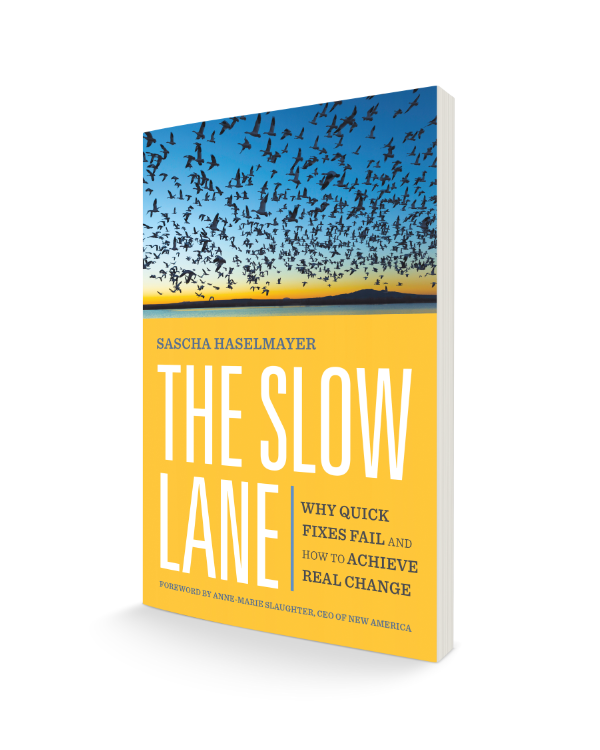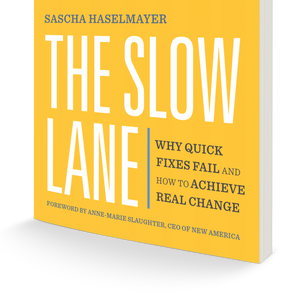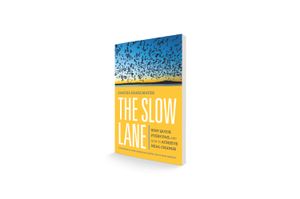“The Slow Lane: Why Quick Fixes Fail and How to Achieve Real Change” with a Foreword by Anne-Marie Slaughter, CEO of New America. Out now.
We live in a world of quick fixes. In business, government, and society, we celebrate the entrepreneurs, hackers, and disruptors who try to deal with change by finding shortcuts. They give us a sense that any big problem can be resolved by a daring, often technological solution.
But, as the past decades have repeatedly shown, these quick fixes are nothing more than an illusion. It turns out that there is no technical fix to climate change, injustice, discrimination, pollution, or rising inequality.
And yet, we continue to glorify leaders who promise to fix things for us. I call this phenomenon the Fast Lane. In business, the Fast Lane gives us companies like Facebook that look past hate speech to gain a dominant position in the market faster. In politics, it gives us leaders who assert their ‘leadership’ by imposing quick fixes in moments of crisis, like the austerity measures that threw millions of people into poverty following the global financial crisis of 2007/8. And at home, it poisons our relationships. Parents reduce their children’s lives to a race to the top, justifying any means necessary to get their ends.
In the Fast Lane, leaders at all levels of society adhere to the same playbook: act fast by cancelling the voices of others, and exercise power decisively.
But instead of the progress it promises, this behavior fuels a downward spiral of growing inequality and division, that leaves our most urgent problems unsolved.
Order The Slow Lane book now!

I consider myself to be a product of the Fast Lane. Growing up, my parents defined success in strictly monetary terms, as well as our ability to come out on top of others. Eventually, it was my deep desire for social change that led me out of the Fast Lane because it simply wasn’t any good at delivering real change. From there, I quite literally stumbled into the Slow Lane.
For twenty years, I had been a quick-fixer. I travelled the world, to help governments and communities solve their problems faster.
But wherever I went, the reality on the ground tried to teach me something else entirely. It took a visit to a notorious prison in London in 2014 to open my eyes to what I had seen all along: that the quickest way to change the world is to slow down and listen. Here I was, seeing social change happen right in front of my eyes in the most unlikely of places. It happened because Kevin Reilly, the prison governor, had the humility to not respond to a crisis by trying to fix things quickly. Instead, for the first time in 172 years, he had the humility to ask the prisoners to help him solve the prison’s problems. This simple, yet counter-intuitive, response connected the dots in a new way to what I had seen the world over. The Slow Lane came into focus.
The Slow Lane is at work all around us. Most notably, it is made up of movements for social progress. They have an urgent desire for change, to tackle injustices like the broken probation system in the UK or chronic levels of homelessness in American cities.
Unlike the Fast Lane, these movements choose not to cancel out the complicated voice of others to get things done, but create the kind of trusted conversation that brings people together.
This is what seemingly slows them down, making it easy to overlook them entirely in a world that celebrates big, decisive action. But this slowness is incredibly productive, as it empowers even the most disadvantaged people to become active contributors to change.
Over time, this social capital can lead to the kind of explosive and transformative change that fundamentally replaces a broken system with new laws, mindsets, behaviors, or economies.
Successful Slow Lane movements adhere to five common principles. They need to hold their urgency (#1), accepting the notion that even in moments of crisis they have to move at the speed of trust instead of rushing to action. They’re great listeners (#2), acting with humility that builds the kind of trust that opens hearts and minds to transformative new ideas. To do this, Slow Lane movements also share their agency (#3), meaning that they provide pathways for everyone, even the least prepared, to contribute and lead. And contrary to the common perception that inclusive movements are not agile or inventive, Slow Lane movements turn out to nurture curiosity (#4) to a very high degree, innovating by seeking inspiration from science, arts or other movements. This is how they retain the flexibility to adapt creatively to changing circumstances. Successful Slow Lane movements use technology as an enabler (#5), putting it at the service of their mission for social change, and have created a new playbook that withstands the dominance plays of the traditional tech startup playbook.
These insights are valuable not just for people involved in social change. Even in the intimacy of our homes, we are faced with the same daunting challenges.
Do we empower our children by extending our trust to them to build their life, or do we seek comfort in what appears to be the proven playbook of parenthood: Pushing them to get ahead of others, playing by the rules of the Fast Lane?
Here our trade-offs become much clearer, as we have to navigate the complexity of being trusting with unconditional love, and seeking refuge in becoming the benign dictators that helicopter their offspring to success in a Fast Lane world. At home, too, we can choose to adhere to the Slow Lane principles. Hold the urgency, listen, share the agency, and nurture curiosity – these practices will help us not just empower our children, but prepare them for a Slow Lane world. The Slow Lane, it turns out, offers lessons at any scale. For me, my family, my work, my community, my movement, my business, and my government.
This book offers a timely response to our growing sense of crisis and frustration at our inability to make a difference and change things. I have written The Slow Lane for people who want to make a difference. They include people involved in a movement or community. They include social entrepreneurs. And, as I report in Chapter 7, they include the millions of entrepreneurs who started their business to make a difference. They include public servants, government or elected officials. And they include people who care, and wish to make a difference at home, in their families, among their friends, in their communities, or society.
The Slow Lane offers a holistic alternative, connecting the dots instead of dividing the world up into single topics like social innovation, parenting, government innovation, the ecosystem of philanthropy, activism or economic inclusion.
It explains how the efforts of millions of people across all these sectors are coming together. And what our new journey looks like. Where the Fast Lane has penetrated our families, communities, jobs, economy and politics, the Slow Lane offers a new set of mindsets and practices that help leaders deliver the kind of change and future we all hope for.
And where others tend to pin sectors of society against one another by vilifying government, civil society or business, The Slow Lane finds common ground, starting with the inner work and motivation that help meaningful change come about.
I am fortunate to have lived and worked in these different worlds. I am offering to be a guide to the Slow Lane from the inside. As a social entrepreneur, I have built movements and businesses, and have worked alongside the world’s leading innovators in government, philanthropy, society, and business. I have lived and worked in the communities I write about. And as a citizen and parent, I have been grappling to find my role every day. All this gives me a first-hand insight, that adds nuance to the stories in this book. My stories reveal, that you don’t have to be a super-human to join the Slow Lane, but that it is made up of people who struggle with the same choices, doubts, and setbacks, we all face. I am delighted to share these stories with you, and hope that they spark new insights and ideas.







